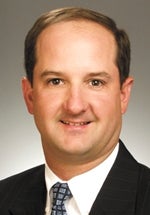When Gov. Deval Patrick came to Worcester in late October to announce a round of mid-year budget cuts, nonprofit organizations, especially those in the health and human services sector, gasped.
Patrick’s more than $350 million in cuts included $81 million from the health and human services budget that those organizations depend on.
Some organizations, like the National Alliance on Mental Illness in Woburn, saw it coming and tried to preempt Patrick.
“We will not take it anymore,” Tobias Fisher, executive director of NAMI Massachusetts, said in a scathing statement. “We’ve been cut, cut, cut.”
But while $81 million is a lot of money, mental health advocates in Central Massachusetts say those cuts may pale in comparison to expected cuts to the state’s Medicaid program. How much will be slashed from the state’s share of Medicaid reimbursements isn’t yet clear, said Vicker DiGravio, president and CEO of the Association for Behavioral Health Care, but those reimbursements make up a huge portion of many organizations’ revenue. Combined with state budget cuts, Medicaid shortfalls could be devastating.
The so-called 9C cuts made by Patrick “were not nearly as devastating as we were expecting,” said DiGravio. However, he said cuts to Medicaid, a Medicare-type program for the poor, could prove too costly for some nonprofits to bear.
Section 9C of Chapter 29 of the Massachusetts General Laws requires that when the state’s projected revenue is less than projected spending, the governor must act to ensure that the budget is brought into balance.
The ABH represents 91 member organizations across the state. Several, including YOU Inc. in Worcester, Advocates Inc. in Framingham, the Luk Crisis Center in Fitchburg and the George B. Wells Human Service Center in Southbridge, are in Central Massachusetts.
Disparate Impact
For some, Patrick’s latest round of 9C cuts were a disaster. Others have been carried through by advanced planning.
“So far, it hasn’t been too bad,” said Charles Faris, president of Spectrum Health Systems Inc. in Worcester. “However, we anticipated this being a tough year, so we really budgeted no increase over last year.”
About 20 percent of Spectrum’s revenue comes from Medicaid reimbursements, and so far, Faris hasn’t heard anything definitive about cuts to the program.
For organizations that haven’t put in the time to plan and budget, any cuts to Medicaid could spell disaster.
“We anticipate that over the next year or two, there are going to be fewer players out there,” Faris said. “They’re running continuous deficits, and they’re not going to be able to continue. We’ve tried to be very cautious in terms of what we’ve taken on. We’re not taking on excessive risk, and we’ve taken steps to pay down our long-term debt.”
Spectrum, which runs substance abuse services for prisons, has been growing in recent years. Other human services and mental health organizations haven’t been so fortunate, and the state budget has only compounded the problem.
“We know that the state government and state budget works in cycles,” DiGravio said. “There are times when things are good and we also know that there are bad times. Our members see the current situation as the worst they’ve ever seen, and this is going back to the late ‘80s.”
As it stands, mental health and human services organizations are bracing for cuts of as much as 12 to 15 percent, DiGravio said.
“It’s very possible that there will be fewer organizations providing services. There may be mergers, and that may not impact access,” he said. But the worst case would also result in loss of services and job loss.
The 91 members of the ABH serve about 117,000 clients on any given day and employ some 20,000 people.
And the rates the state pays are not the greatest,” DiGravio said, so people in direct care jobs at these organizations can make as little as $10 per hour.
Moe Boisvert, president and CEO of Youth Opportunities Upheld, Inc. in Worcester, said YOU Inc. takes in about 40 percent of its total revenue from Medicaid. YOU Inc.’s total revenue runs between $12 million and $14 million, Boisvert said.
He said the latest figures he’s seen suggest that out of $300 million in possible cuts to the state Medicaid program, $100 million could come from the mental health sector.
“Medicaid cuts, how they translate into reality is they will narrow the gate for access to care,” he said. “How it plays out for each individual agency is impossible to predict,” but for patients, it could mean difficulty getting the care and treatment they need.
“Clients don’t always understand what’s going on. They’re looking for help, and they’re not getting it very easily. It’s very confusing.”

